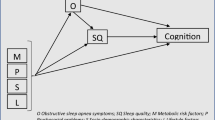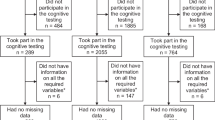Abstract
Aims
Diabetes is linked to cognitive impairment. Sleep plays a role in memory consolidation. Sleep disturbances, commonly found in patients with diabetes, were shown to be related to cognitive dysfunction. This study explored the role of sleep in cognitive function of patients with abnormal glucose tolerance.
Methods
A total of 162 patients (81 type 2 diabetes and 81 prediabetes) participated. Sleep duration and sleep efficiency (an indicator of sleep quality) were obtained using 7-day actigraphy recordings. Obstructive sleep apnea (OSA) was screened using an overnight in-home monitor. Cognitive function was assessed using the Montreal Cognitive Assessment (MoCA). Three sub-scores of MoCA, visuoexecutive function, attention and delayed recall, were also analyzed.
Results
Mean age was 54.8 (10.2) years. OSA was diagnosed in 123 participants (76.9%). Mean sleep duration was 6.0 (1.0) h and sleep efficiency was 82.7 (8.1) %. Sleep duration and OSA severity were not related to MoCA scores. Higher sleep efficiency was associated with higher MoCA scores (p = 0.003), and having diabetes (vs. prediabetes) was associated with lower MoCA scores (p = 0.001). After adjusting covariates, both having diabetes (vs. prediabetes) (B = − 1.137, p = 0.002) and sleep efficiency (B = 0.085, p < 0.001) were independently associated with MoCA scores. In addition, diabetes (B = − 0.608, p < 0.001) and sleep efficiency (B = 0.038, p < 0.001) were associated with visuoexecutive function. Sleep parameters were not related to delayed recall or attention scores.
Conclusion
Lower sleep efficiency is independently associated with lower cognitive function in patients with abnormal glucose tolerance. Whether sleep optimization may improve cognitive function in these patients should be explored.
Similar content being viewed by others
References
Moheet A, Mangia S, Seaquist ER (2015) Impact of diabetes on cognitive function and brain structure. Ann N Y Acad Sci 1353:60–71. https://doi.org/10.1111/nyas.12807
American Psychiatric Association (2013) Diagnostic and statistical manual of mental disorders, Fifth Edition (DSM-5). American Psychiatric Publishing, Washington, D.C.
Simó R, Ciudin A, Simó-Servat O, Hernández C (2017) Cognitive impairment and dementia: a new emerging complication of type 2 diabetes—the diabetologist’s perspective. Acta Diabetol 54:417–424. https://doi.org/10.1007/s00592-017-0970-5
Manschot SM, Brands AM, van der Grond J et al (2006) Brain magnetic resonance imaging correlates of impaired cognition in patients with type 2 diabetes. Diabetes 55:1106–1113
Grodstein F, Chen J, Wilson RS, Manson JE (2001) Type 2 diabetes and cognitive function in community-dwelling elderly women. Diabetes Care 24:1060–1065
Chatterjee S, Peters SA, Woodward M et al (2016) Type 2 diabetes as a risk factor for dementia in women compared with men: a pooled analysis of 2.3 million people comprising more than 100,000 cases of dementia. Diabetes Care 39:300–307. https://doi.org/10.2337/dc15-1588
Biessels GJ, Reijmer YD (2014) Brain changes underlying cognitive dysfunction in diabetes: what can we learn from MRI? Diabetes 63:2244–2252. https://doi.org/10.2337/db14-0348
van Harten B, de Leeuw FE, Weinstein HC, Scheltens P, Biessels GJ (2006) Brain imaging in patients with diabetes: a systematic review. Diabetes Care 29:2539–2548. https://doi.org/10.2337/dc06-1637
Hassing LB, Grant MD, Hofer SM et al (2004) Type 2 diabetes mellitus contributes to cognitive decline in old age: a longitudinal population-based study. J Int Neuropsychol Soc 10:599–607. https://doi.org/10.1017/S1355617704104165
Kanaya AM, Barrett-Connor E, Gildengorin G, Yaffe K (2004) Change in cognitive function by glucose tolerance status in older adults: a 4-year prospective study of the Rancho Bernardo study cohort. Arch Intern Med 164:1327–1333. https://doi.org/10.1001/archinte.164.12.1327
Hugenschmidt CE, Lovato JF, Ambrosius WT et al (2014) The cross-sectional and longitudinal associations of diabetic retinopathy with cognitive function and brain MRI findings: the Action to Control Cardiovascular Risk in Diabetes (ACCORD) trial. Diabetes Care 37:3244–3252. https://doi.org/10.2337/dc14-0502
Cukierman-Yaffe T, Gerstein HC, Williamson JD et al (2009) Relationship between baseline glycemic control and cognitive function in individuals with type 2 diabetes and other cardiovascular risk factors: the action to control cardiovascular risk in diabetes-memory in diabetes (ACCORD-MIND) trial. Diabetes Care 32:221–226. https://doi.org/10.2337/dc08-1153
Sullivan MD, Katon WJ, Lovato LC et al (2013) Association of depression with accelerated cognitive decline among patients with type 2 diabetes in the ACCORD-MIND trial. JAMA Psychiatry 70:1041–1047. https://doi.org/10.1001/jamapsychiatry.2013.1965
Snowden MB, Steinman LE, Bryant LL et al (2017) Dementia and co-occurring chronic conditions: a systematic literature review to identify what is known and where are the gaps in the evidence? Int J Geriatr Psychiatry 32:357–371. https://doi.org/10.1002/gps.4652
Punthakee Z, Miller ME, Launer LJ et al (2012) Poor cognitive function and risk of severe hypoglycemia in type 2 diabetes: post hoc epidemiologic analysis of the ACCORD trial. Diabetes Care 35:787–793. https://doi.org/10.2337/dc11-1855
Scullin MK, Bliwise DL (2015) Sleep, cognition, and normal aging: integrating a half century of multidisciplinary research. Perspect Psychol Sci 10:97–137. https://doi.org/10.1177/1745691614556680
Virta JJ, Heikkila K, Perola M et al (2013) Midlife sleep characteristics associated with late life cognitive function. Sleep 36:1533–1541. https://doi.org/10.5665/sleep.3052 (1541A)
Xu L, Jiang CQ, Lam TH et al (2014) Sleep duration and memory in the elderly Chinese: longitudinal analysis of the Guangzhou Biobank Cohort Study. Sleep 37:1737–1744. https://doi.org/10.5665/sleep.4162
Keage HA, Banks S, Yang KL (2012) What sleep characteristics predict cognitive decline in the elderly? Sleep Med 13:886–892. https://doi.org/10.1016/j.sleep.2012.02.003
Benito-Leon J, Louis ED, Bermejo-Pareja F (2013) Cognitive decline in short and long sleepers: a prospective population-based study (NEDICES). J Psychiatr Res 47:1998–2003. https://doi.org/10.1016/j.jpsychires.2013.09.007
Tworoger SS, Lee S, Schernhammer ES, Grodstein F (2006) The association of self-reported sleep duration, difficulty sleeping, and snoring with cognitive function in older women. Alzheimer Dis Assoc Disord 20:41–48. https://doi.org/10.1097/01.wad.0000201850.52707.80
Bubu OM, Brannick M, Mortimer J et al (2017) Sleep, cognitive impairment, and Alzheimer’s disease: a systematic review and meta-analysis. Sleep. https://doi.org/10.1093/sleep/zsw032
Blackwell T, Yaffe K, Laffan A et al (2014) Associations of objectively and subjectively measured sleep quality with subsequent cognitive decline in older community-dwelling men: the MrOS sleep study. Sleep 37:655–663. https://doi.org/10.5665/sleep.3562
Reutrakul S, Van Cauter E (2014) Interactions between sleep, circadian function, and glucose metabolism: implications for risk and severity of diabetes. Ann N Y Acad Sci 1311:151–173. https://doi.org/10.1111/nyas.12355
Lal C, Strange C, Bachman D (2012) Neurocognitive impairment in obstructive sleep apnea. Chest 141:1601–1610. https://doi.org/10.1378/chest.11-2214
Boland LL, Shahar E, Iber C (2002) Measures of cognitive function in persons with varying degrees of sleep-disordered breathing: the Sleep Heart Health Study. J Sleep Res 11:265–272
Olaithe M, Skinner TC, Hillman D, Eastwood PE, Bucks RS (2015) Cognition and nocturnal disturbance in OSA: the importance of accounting for age and premorbid intelligence. Sleep Breath 19:221–230. https://doi.org/10.1007/s11325-014-1000-2
Kushida CA, Nichols DA, Holmes TH et al (2012) Effects of continuous positive airway pressure on neurocognitive function in obstructive sleep apnea patients: the Apnea Positive Pressure Long-term Efficacy Study (APPLES). Sleep 35:1593–1602. https://doi.org/10.5665/sleep.2226
Holingue C, Wennberg A, Berger S, Polotsky VY, Spira AP (2018) Disturbed sleep and diabetes: a potential nexus of dementia risk. Metab Clin Exp. https://doi.org/10.1016/j.metabol.2018.01.021
Li H, Gong Q, Shao J, Liu X, Zhao Y (2014) Cognitive dysfunction in type 2 diabetes patients accompanied with obstructive sleep apnea syndrome. Pak J Med Sci 30:1388–1392. https://doi.org/10.12669/pjms.306.5861
American Diabetes Association (2017) Standards of medical care in diabetes-2017. Diabetes Care 40:S1–S142
Tangwongchai S, Charenboon T, Phanasathit M et al (2009) The validity of thai version of the montreal cognitive assessment (MoCA-T). Dement Neuropsychol 3:172
Radloff L (1977) The CES-D scale: a self-report depression scale for research in the general population. Appl Psychol Meas 1:385–401
Trangkasombat U, Larpboonsarp V, Havanond P (1997) CES-D as a screen for depression in adolescents. J Psychiatr Assoc Thail 42:2–13
Ploylermsang C (2005) Contructive validity of the CES-D depression sclae among student. IJPS 1:25–39
Yuceege M, Firat H, Demir A, Ardic S (2013) Reliability of the Watch-PAT 200 in detecting sleep apnea in highway bus drivers. J Clin Sleep Med 9:339–344. https://doi.org/10.5664/jcsm.2584
Zou D, Grote L, Peker Y, Lindblad U, Hedner J (2006) Validation a portable monitoring device for sleep apnea diagnosis in a population based cohort using synchronized home polysomnography. Sleep 29:367–374
Lambiase MJ, Gabriel KP, Kuller LH, Matthews KA (2014) Sleep and executive function in older women: the moderating effect of physical activity. J Gerontol Ser A Biol Sci Med Sci 69:1170–1176. https://doi.org/10.1093/gerona/glu038
Holanda FWNJ., de Almondes KM (2016) Sleep and executive functions in older adults: a systematic review. Dement Neuropsychol 10:185–197. https://doi.org/10.1590/s1980-5764-2016dn1003004
Lim AS, Kowgier M, Yu L, Buchman AS, Bennett DA (2013) Sleep fragmentation and the risk of incident Alzheimer’s disease and cognitive decline in older persons. Sleep 36:1027–1032. https://doi.org/10.5665/sleep.2802
Yaffe K, Blackwell T, Barnes DE, Ancoli-Israel S, Stone KL (2007) Preclinical cognitive decline and subsequent sleep disturbance in older women. Neurology 69:237–242. https://doi.org/10.1212/01.wnl.0000265814.69163.da
Blackwell T, Yaffe K, Ancoli-Israel S et al (2006) Poor sleep is associated with impaired cognitive function in older women: the study of osteoporotic fractures. J Gerontol Ser A Biol Sci Med Sci 61:405–410
Ju YE, McLeland JS, Toedebusch CD et al (2013) Sleep quality and preclinical Alzheimer disease. JAMA Neurol 70:587–593. https://doi.org/10.1001/jamaneurol.2013.2334
Lim AS, Yu L, Kowgier M (2013) Modification of the relationship of the apolipoprotein E epsilon4 allele to the risk of Alzheimer disease and neurofibrillary tangle density by sleep. JAMA Neurol 70:1544–1551. https://doi.org/10.1001/jamaneurol.2013.4215
Stamatakis KA, Punjabi NM (2010) Effects of sleep fragmentation on glucose metabolism in normal subjects. Chest 137:95–101. https://doi.org/10.1378/chest.09-0791
Willette AA, Bendlin BB, Starks EJ et al (2015) Association of insulin resistance with cerebral glucose uptake in late middle-aged adults at risk for Alzheimer disease. JAMA Neurol 72:1013–1020. https://doi.org/10.1001/jamaneurol.2015.0613
Ekblad LL, Rinne JO, Puukka P et al (2017) Insulin resistance predicts cognitive decline: an 11-year follow-up of a nationally representative adult population sample. Diabetes Care. https://doi.org/10.2337/dc16-2001
Lucassen EA, Piaggi P, Dsurney J et al (2014) Sleep extension improves neurocognitive functions in chronically sleep-deprived obese individuals. PLoS One 9:e84832. https://doi.org/10.1371/journal.pone.0084832
Allain H, Patat A, Lieury A et al (1995) Comparative study of the effects of zopiclone (7.5 mg), zolpidem, flunitrazepam and a placebo on nocturnal cognitive performance in healthy subjects, in relation to pharmacokinetics. Eur Psychiatry 10(Suppl 3):129 s–135 s. https://doi.org/10.1016/0924-9338(96)80094-0
Sattar L, Renneboog B, Decaux G (2017) Hyperglycemia induces attention and gait deficits in diabetic mellitus patients. Acta Diabetol 54:953–959. https://doi.org/10.1007/s00592-017-1034-6
Sang YM, Wang LJ, Mao HX, Lou XY, Zhu YJ (2018) The association of short-term memory and cognitive impairment with ghrelin, leptin, and cortisol levels in non-diabetic and diabetic elderly individuals. Acta Diabetol. https://doi.org/10.1007/s00592-018-1111-5
Trento M, Charrier L, Salassa M et al (2015) Depression, anxiety and cognitive function in patients with type 2 diabetes: an 8-year prospective observational study. Acta Diabetol 52:1157–1166. https://doi.org/10.1007/s00592-015-0806-0
van Bussel FC, Backes WH, van Veenendaal TM et al (2016) Functional brain networks are altered in type 2 diabetes and prediabetes: signs for compensation of cognitive decrements? The Maastricht Study. Diabetes 65:2404–2413. https://doi.org/10.2337/db16-0128
Funding
This work was funded by a grant from Mahidol University, Bangkok, Thailand; and a grant from the Health Systems Research Institute (HSRI), Thailand and National Research Council of Thailand (Grant no. 60-042); and was supported in part by a research grant from Investigator-Initiated Studies Program of Merck Sharp & Dohme Corp, MSIP 0000-349. The opinion expressed in this paper are those of the authors and do not necessarily represent those of study sponsors or Merck Sharp & Dohme Corp.
Author information
Authors and Affiliations
Corresponding author
Ethics declarations
Conflict of interest
Dr. Reutrakul reports grants from Merck Sharp and Dohme, non-financial support from ResMed, personal fees from Novo Nordisk, personal fees from Sanofi Aventis, personal fees from Medtronic, outside the submitted work. All other authors have nothing to disclose.
Human and animal rights
All procedures followed were in accordance with the ethical standards of the responsible committee on human experimentation (institutional and national) A and with the Helsinki Declaration of 1975, as revised in 2008.
Informed consent
Informed consent was obtained from all patients for being included in the study.
Additional information
Managed by Antonio Secchi.
Rights and permissions
About this article
Cite this article
Saetung, S., Nimitphong, H., Siwasaranond, N. et al. The relationship between sleep and cognitive function in patients with prediabetes and type 2 diabetes. Acta Diabetol 55, 917–925 (2018). https://doi.org/10.1007/s00592-018-1166-3
Received:
Accepted:
Published:
Issue Date:
DOI: https://doi.org/10.1007/s00592-018-1166-3




